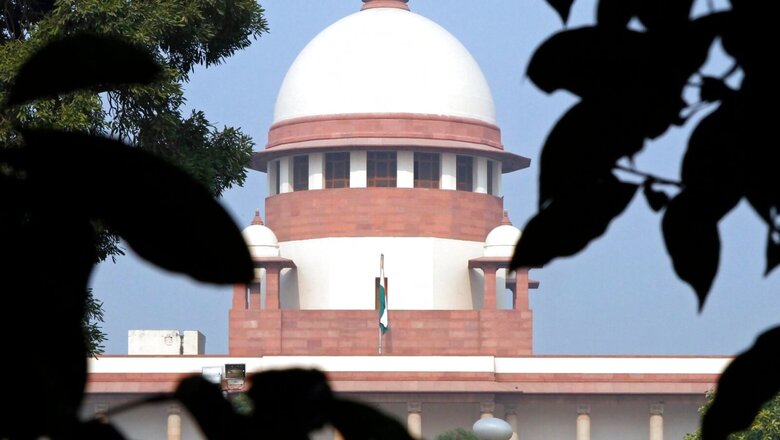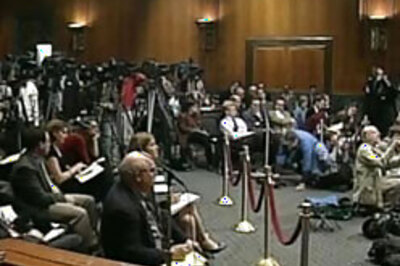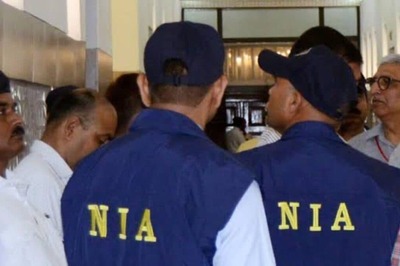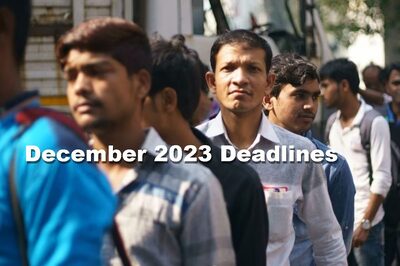
views
The Supreme Court on Tuesday observed orally it was difficult to accept the Centre’s submission that the concept of federalism does not apply to a union territory as even ‘panchayats’ are an example for “decentralisation of power”.
A five-judge Constitution bench headed by Chief Justice DY Chandrachud, which continued the hearing for a fourth day on the vexatious Centre-Delhi government row over control of services, was told by Solicitor General Tushar Mehta, appearing for the central government, a “crafted perception” has been created that the Delhi government has no powers.
The law officer said, “My fundamental submissions are that we cannot lose sight of the fact that we are dealing with the capital of the nation and the central government has a huge part to play in its administration.” He said services and the control over them are not applicable to union territories (UTs) at all.
“The union territory represents and is the extension of the Union and hence, there is no concept of federalism between the Union and its extended area,” he said.
“It may be difficult to accept your (Centre’s) submission that federalism only applies to states and the Union. There may be a different degree of federalism between UTs and Union. It may not have all features of federalism but may have some,” orally observed the bench which also comprised Justices M R Shah, Krishna Murari, Hima Kohli and P S Narasimha.
The concept of federalism, the bench said, was prevalent even in panchayats.
“Some characteristics of federalism are prevalent even in relations with UTs. Even in ‘panchayats’, the concept of federalism is reflective of the need of the local government, decentralisation of power,” the bench said.
Referring to the constitutional and legal provisions, the solicitor general said those who are working for the affairs of the government of the national capital are working for the Centre and, moreover, India is a “quasi federal” State.
At the fag end of the hearing, the bench specifically asked senior advocate A M Singhvi, appearing for the Aam Aadmi Party (AAP) government, as to what the Delhi government wanted from this court.
“I am seeking what is rightfully mine, my legislative rights in Entry 41 (State public services; State Public Service Commission) of the State list. I seek all my legislative rights under all entries of the State list minus three entries (Public order, Police and Land),” he said.
Singhvi also said he was seeking all executive powers in relation to the entries under the State List where the Delhi legislative assembly is capable of making laws.
He said the Delhi government wanted clarity on the issue of control of services in the national capital as even this court would not like the dispute to recur.
At the outset, the solicitor general raised the issue of the ongoing protest by AAP MLAs led by Chief Minister Arvind Kejriwal against the alleged interference by the lieutenant governor’s office in the Delhi government’s works and termed them “undesirable”.
“Let me demolish the crafted perception that we (Delhi government) have no power,” the law officer said. He referred to the power of the chief minister to assess the performance of IAS and other officers by writing their annual performance report.
He said, moreover, from 1992 till date, everything has worked out well between the Delhi government and Centre with political maturity.
“Delhi is indisputably not a state,” he asserted, adding the President has already delegated all the powers related to the services to the administrator that is LG. Parliament very consciously omitted any separate service for UT from Part 14 (of the Constitution),” Mehta said.
When the law officer said a UT cannot have its own public service commission, the bench pointed out the Union Territory of Jammu and Kashmir has a state public service commission.
“There was a public service commission in Jammu and Kashmir. They were bifurcated in two and Parliament wanted to continue with the public service commission…,” the law officer said, adding the Centre can provide a service commission to a UT under Entry 41 of the State list.
The court said the Centre cannot provide for a service commission in a UT under Entry 41 of the State List and that it can be done under Entry 97 (any other matter not enumerated in List II or List III including any tax not mentioned in either of those Lists) of the Union List.
The law officer said the functional control over the services was with the Delhi government and the administrative control as to where an officer will be posted, transferred is necessary to be vested with the Centre as Delhi is the national capital.
“In states, the most important part is where you post the officer. What you are saying is that we will post you as the secretary finance and you will report to the minister. Suppose they find that someone is not functioning effectively, then they (Delhi government) cannot even switch officers,” the bench said.
“They can. They can always send a letter to the MHA (ministry of Home Affairs) through LG,” Mehta said, adding the MHA takes the action.
“That is the matter of accommodation. The officer knows that I cannot be moved unless there is a green signal from the Ministry of Home Affairs,” the bench said.
Sometimes, a wrong perception, repeated several times, has the power to change the impression, the law officer said and concluded the submissions on Centre’s behalf.
The court will resume hearing rejoinder submissions of Singhvi on Wednesday.
Earlier, the top court had termed “collective responsibility, aid and advice” as the “bedrocks of democracy” and said it will have to find a balance and decide whether the control over services should be with Centre or the Delhi government or a median has to be found.
The Constitution bench has been set up to hear the legal issue concerning the scope of legislative and executive powers of the Centre and the National Capital Territory government over control of services in Delhi.
On May 6, the top court had referred to a five-judge Constitution bench the issue of control of services in Delhi.
The apex court had said the limited issue of control over services was not dealt with by the Constitution bench which elaborately tackled all legal questions on the powers of the Centre and the Delhi government in 2018.
“The limited issue that has been referred to this Bench relates to the scope of legislative and executive powers of the Centre and NCT Delhi with respect to the term services. The Constitution bench of this court, while interpreting Article 239AA(3)(a) of the Constitution, did not find any occasion to specifically interpret the impact of the wordings of the same with respect to Entry 41 in the State List.
“We, therefore, deem it appropriate to refer to the above-limited question, for an authoritative pronouncement by a Constitution Bench…, it had said.
Sub Article 3 (a) of 239AA (which deals with the status and power of Delhi in the Constitution deals with the law-making power of the Delhi Legislative Assembly on the matters enumerated in the State List or the Concurrent List.
The plea by the Delhi government arises out of a split verdict of February 14, 2019 in which a two-judge bench of Justices A K Sikri and Ashok Bhushan, both now retired, had recommended to the Chief Justice of India that a three-judge bench be set up to finally decide the issue of control of services in the national capital.
Justice Bhushan had ruled the Delhi government had no power at all over administrative services, while Justice Sikri made a distinction. He said the transfer or posting of officers in top echelons of the bureaucracy (joint director and above) can only be done by the Central government and the view of the lieutenant governor will prevail in case of a difference of opinion on matters related to other bureaucrats.
In the 2018 judgement, a five-judge Constitution bench had unanimously held that the Lieutenant Governor of Delhi is bound by the aid and advice of the elected government, and both needed to work harmoniously with each other.
Read all the Latest India News here




















Comments
0 comment